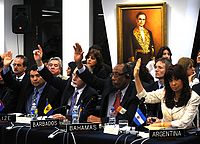Canada and the OAS
Although Canada was a founding member of the League of Nations in 1919[20] and has joined international organizations since that date, it chose not to join the OAS when it was first formed, despite its close relations with the United States. Canada became a Permanent Observer in the OAS on 2 February 1972. Canada signed the Charter of the Organization of American States on 13 November 1989 and this decision was ratified on 8 January 1990.
In 2004–2005, Canada was the second largest contributor to the OAS, with an annual assessed contribution representing 12.36 percent of the OAS Regular Budget (US$9.2 million) and an additional C$9 million in voluntary contributions to specific projects. Shortly after joining as a full member, Canada was instrumental in the creation of the Unit for the Promotion of Democracy, which provides support for the strengthening and consolidation of democratic processes and institutions in OAS member states.
Sanctions against the Dominican Republic]
During the 6th Conference of Foreign Ministers of the Organization of American States (OAS) in Costa Rica, from 16 to 20 August 1960, a conviction against the State of the Dominican Republic was agreed to unanimously. The penalty was motivated because the foreign ministers checked the veracity of the claim that the Rafael Trujillo regime had sponsored an attack against Rómulo Betancourt, at that time, constitutional president of Venezuela. The meeting was attended by foreign ministers from 21 American nations, including Cuba, which at that time had not yet been expelled from the inter-American system.
All countries, including the United States and Haiti, broke off diplomatic relations with the Dominican Republic. Additionally an economic blockade that affected the exports of sugar was applied, which at that time was the pillar of the Dominican economy.
It was the first application of the Inter-American Treaty of Reciprocal Assistance, which had been adopted at the OAS on July 29, 1960.
Status of Cuba]
Further information: Cuba–OAS relations
The current government of Cuba was excluded from participation in the Organization under a decision adopted by the Eighth Meeting of Consultation in Punta del Este, Uruguay, on 31 January 1962. The vote was passed by 14 in favor, with one against (Cuba) and six abstentions (Argentina, Bolivia, Brazil, Chile, Ecuador, and Mexico). The operative part of the resolution reads as follows:
#That adherence by any member of the Organization of American States to Marxism-Leninism is incompatible with the inter-American system and the alignment of such a government with the communist bloc breaks the unity and solidarity of the continents.
That the present Government of Cuba, which has officially identified itself as a Marxist-Leninist government, was incompatible with the principles and objectives of the inter-American system.
That this incompatibility excluded the present Government of Cuba from participation in the inter-American system. This meant that the Cuban nation was still technically a member state, but that the current government was denied the right of representation and attendance at meetings and of participation in activities.
The OAS’s position was that although Cuba’s participation was suspended, its obligations under the Charter, the American Declaration of the Rights and Duties of Man, etc. still hold: for instance, the Inter-American Commission on Human Rights continued to publish reports on Cuba’s human rights situation and to hear individual cases involving Cuban nationals. However, this stance was occasionally questioned by other individual member states.
Cuba’s position was stated in an official note sent to the Organization “merely as a courtesy” by Minister of Foreign Affairs Dr. Raúl Roa on 4 November 1964: “Cuba was arbitrarily excluded … The Organization of American States has no juridical, factual, or moral jurisdiction, nor competence, over a state which it has illegally deprived of its rights.
The reincorporation of Cuba as an active member regularly arose as a topic within the inter-American system – for instance, it was intimated by the outgoing ambassador of Mexico in 1998 – but most observers did not see it as a serious possibility while the present government remained in power. Since 1960, the Cuban administration had repeatedly characterized the OAS as the “Ministry of Colonies” of the United States of America.
On 6 May 2005, President Fidel Castro reiterated that the island nation would not “be part of a disgraceful institution that has only humiliated the honor of Latin American nations.” After Fidel Castro’s recent retirement and the ascent of his brother Raúl to power, this official position was reasserted. Venezuelan President Hugo Chávez promised to veto any final declaration of the 2009 Summit of the Americas due to Cuba’s exclusion.
On 17 April 2009, after a “trading of warm words” between the administrations of U.S. President Barack Obama and Cuban leader Raúl Castro, OAS Secretary General José Miguel Insulza said he would ask the 2009 General Assembly to annul the 1962 resolution excluding Cuba.
On 3 June 2009, foreign ministers assembled in San Pedro Sula, Honduras, for the OAS’s 39th General Assembly, passed a vote to lift Cuba’s suspension from the OAS. The United States had been pressuring the OAS for weeks to condition Cuba’s readmission to the group on democratic principles and commitment to human rights. Ecuador’s Foreign Minister Fander Falconí said there will be no such conditions. “This is a new proposal, it has no conditions—of any kind,” Falconí said. “That suspension was made in the Cold War, in the language of the Cold War. What we have done here is fix a historic error.” The suspension was lifted at the end of the General Assembly, but, to be readmitted to the Organization, Cuba will need to comply with all the treaties signed by the Member States, including the Inter-American Democratic Charter of 2001.
A statement issued by the Cuban government on 8 June 2009 stated that while Cuba welcomed the Assembly’s gesture, in light of the Organization’s historical record “Cuba will not return to the OAS.
Suspension of Honduras (2009–2011)

Those attending the Extraordinary Assembly of the OAS voted to suspend Honduras.
Following the expulsion of its President Manuel Zelaya, Honduras’ membership of the Organization was suspended unanimously at midnight on 5 July 2009. The de facto government had already announced it was leaving the OAS hours earlier; this was not, however, taken into account by the OAS, which did not recognize that government as legitimate.
An extraordinary meeting had been conducted by the OAS in Washington, D.C., with Zelaya in attendance. The suspension of Honduras was approved unanimously with 33 votes (Honduras did not vote). This was the first suspension carried out by the OAS since that of Cuba in 1962.
After Zelaya’s return to Honduras in 2011, the country was re-admitted to the Organization on 1 June 2011 with 32 votes in favor and 1 (Ecuador) against. Venezuela expressed some reservations.
Status of Venezuela]
On 28 April 2017 Venezuela notified the OAS of its denunciation of the Charter of the OAS, which as per Article 143 would lead to the withdrawal of Venezuela from the OAS effective two years from the date of notification.[17] During this period, the country did not plan on participating in the OAS.
During the 2019 Venezuelan presidential crisis, the President of the National Assembly of Venezuela Juan Guaidó, who was recognized by the National Assembly as the acting president, sent a letter to the OAS Secretary General annulling the previous denunciation of the OAS Charter, and expressing his desire for Venezuela to remain a member of the OAS. The National Assembly designated a special envoy as representative to the OAS, lawyer Gustavo Tarre Briceño, who the OAS voted to recognize as Venezuela’s delegate in April.

